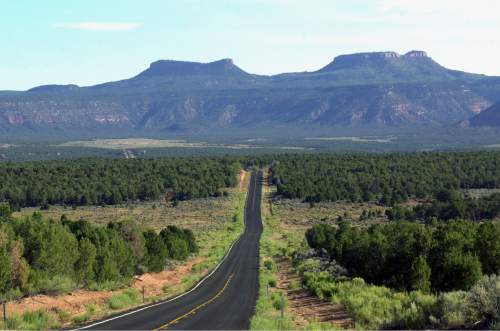This is an archived article that was published on sltrib.com in 2016, and information in the article may be outdated. It is provided only for personal research purposes and may not be reprinted.
Washington • Interior Secretary Sally Jewell will visit Utah this summer as part of a tour highlighting the need for a "course correction" to ensure healthy lands, water and wildlife that could offer a prelude to presidential action naming a new national monument.
In a major policy speech Tuesday, Jewell said she will visit Utah "where there are a range of conservation proposals — legislative and otherwise – to further protect public lands."
She did not clarify what non-legislative proposals mean, but it could be a nod to the possibility that President Barack Obama would use his authority to name a new Bears Ears National Monument in southeastern Utah. Tribal leaders have urged Obama to use the Antiquities Act to preserve some 1.9 million acres.
Jewell did not specifically mention Bears Ears, but she did stress the need to broaden the appeal of public lands and parks to a more diverse group of Americans, especially youngsters, who "can visit a place that honors their heritage or culture."
And she cited Native Americans as one of the groups that has been underrepresented in national parks and historic sites, concluding that "there's more to be done."
In another Utah reference, Jewell talked about the need for better long-range planning of resource development near national parks.
"That includes issuing master leasing plans for places like Moab, Utah, where we are collaborating with local stakeholders to develop a blueprint for balancing energy development with conservation and outdoor recreation," she said.
Jewell's possible nod to Bears Ears did not escape the attention of environmental groups and an American Indian group supporting a new monument.
The Bears Ears Inter-Tribal Coalition hailed news of Jewell's visit as a significant step toward its protection.
"By visiting the Bears Ears region, Secretary Jewell will be able to see why it is so important to our people. Unfortunately, she will also see evidence of the looting and vandalism that our ancestral sites are facing and the urgent need to protect the Bears Ears region as a National Monument," Alfred Lomahquahu, Hopi Vice Chairman and Co-Chair of the Bears Ears Inter-Tribal Coalition, said in a news release.
"Protecting Bears Ears was unanimously supported by the Navajo Nation Council and it has overwhelming support from grassroots Navajo people and Navajo Chapters in Utah," said Davis Filfred, Navajo Nation Council Delegate representing Utah chapters.
The Wilderness Society also was quick to praise the speech and its implications.
"New national monuments celebrating women, minorities and our diverse cultures have helped to make public lands even more relevant to greater numbers of Americans," said Jamie Williams, president of The Wilderness Society. "We urge the president to continue to conserve more of America's priceless places as national monuments – like Bears Ears in Utah and other culturally significant sites across the United States."
Utah Reps. Rob Bishop and Jason Chaffetz have been working on legislation called the Public Lands Initiative that they say would bring all parties – from local officials to state representatives, developers and environmentalists – to the table to create a path forward that addresses preservation but also economic development.
Tribal leaders had worked with the Utah Republicans on the proposal but last year said they were frustrated with feeling excluded and took their request straight to the White House to ask that Obama name a monument. The president can designate monuments without congressional approval with the stroke of a pen.
Christy Goldfuss, managing director of the White House Council on Environmental Quality (CEQ), told The Washington Post in February that the administration has "big, big ambitions this year, so let's see what happens."
Later that month, Bishop quizzed Goldfuss about what those ambitions entailed.
"Is CEQ actively working on a national monument proposal for Bears Ears in San Juan County in my state?" Bishop asked during a House Natural Resources Committee hearing.
"I cannot talk about any specific proposals that we're working on out of CEQ or the administration with regard to national monuments," Goldfuss responded.
Utah's all-Republican federal delegation and Gov. Gary Herbert, also Republican, have opposed a new national monument, arguing that preserving land should be a locally driven process.
"Use of the Antiquities Act within [Utah] will be met with fierce local opposition and will further polarize federal land-use discussions for years, if not decades," the members said in a February letter.
Jewell in her speech Tuesday gave a spirited defense of the Antiquities Act, calling it "one of the most important tools a president has to improve our country. It's a tool that should not be used lightly or invoked without serious consideration of the impacts on current and future generations."
But, she added, "I do not think the Act should only be used in places where there is complete agreement, as some are suggesting. If that were the case, then Teddy Roosevelt would never have protected the Grand Canyon or Muir Woods. And Franklin Roosevelt would never have protected Zion or Joshua Tree."



